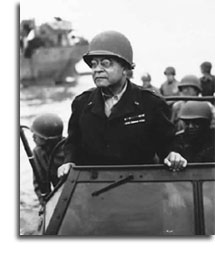| Gen.
Benjamin O. Davis The 99th Pursuit Squadron The Codetalkers The 442nd Infantry Regiment |
![]()
 |
|
| "Brig. Gen. Benjamin O. Davis watches a Signal Corps crew erecting poles, somewhere in France.". (NWDNS-111-SC-192258-S) | |
The armed forces established special units during World War II to accommodate minority groups. These segregated units of American Indians, African Americans, and Japanese Americans served their country heroically in many battlefields in Europe and in the Pacific.
Gen. Benjamin O. Davis
During World War II, General Benjamin O. Davis was the first African-American
general officer in the United States military. General Davis served as
an inspector for the Inspector General and later as a special investigator
with Judge William Hastie for the Secretary of War's Advisory Committee
on Negro Troop Policies. His investigation of discrimination and racial
disturbances brought to light the problems of a racially closed military.
A report issued November 9, 1943, provides an overview of the problems
he uncovered: page
1, page
2, page
3.
A document dated January 20, 1945, recommending General Davis for the Distinguished Service Medal illustrates the numerous occasions upon which the general was ordered to investigate incidents involving African-American troops: page 1 and page 2.
The Hollywood director Frank Capra called upon General Davis to act as a consultant in the filming of The Negro Soldier. The film became required viewing by new troops during the war. General Davis frequently represented the War Department at war bond rallies, servicemen's centers, and at numerous civilian plants where African-American workers were engaged in vital war production. His recommendations were often instrumental in relieving the frustrations of segregated soldiers.